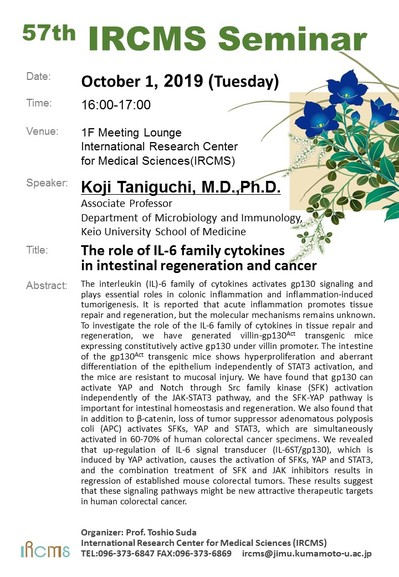- HOME
- IRCMS Seminars
- [October 1] 57th IRCMS Seminar
IRCMS Seminars
[October 1] 57th IRCMS Seminar
September 25 2019
We would like to inform you that the 57th IRCMS Seminar has been scheduled as below. We would be pleased to see many of you participating in the seminar.
Date : October 1, 2019 (Tuesday)
Time : 16:00-17:00
Venue : IRCMS 1F Meeting Lounge
Speaker : Koji Taniguchi, M.D., Ph.D.
Associate Professor
Department of Microbiology and Immunology,
Keio University School of Medicine
Tilte :The role of IL-6 family cytokines in intestinal regeneration and cancer
Abstract:
The interleukin (IL)-6 family of cytokines activates gp130 signaling and plays essential roles in colonic inflammation and inflammation-induced tumorigenesis. It is reported that acute inflammation promotes tissue repair and regeneration, but the molecular mechanisms remains unknown. To investigate the role of the IL-6 family of cytokines in tissue repair and regeneration, we have generated villin-gp130Act transgenic mice expressing constitutively active gp130 under villin promoter. The intestine of the gp130Act transgenic mice shows hyperproliferation and aberrant differentiation of the epithelium independently of STAT3 activation, and the mice are resistant to mucosal injury. We have found that gp130 can activate YAP and Notch through Src family kinase (SFK) activation independently of the JAK-STAT3 pathway, and the SFK-YAP pathway is important for intestinal homeostasis and regeneration. We also found that in addition to β-catenin, loss of tumor suppressor adenomatous polyposis coli (APC) activates SFKs, YAP and STAT3, which are simultaneously activated in 60-70% of human colorectal cancer specimens. We revealed that up-regulation of IL-6 signal transducer (IL-6ST/gp130), which is induced by YAP activation, causes the activation of SFKs, YAP and STAT3, and the combination treatment of SFK and JAK inhibitors results in regression of established mouse colorectal tumors. These results suggest that these signaling pathways might be new attractive therapeutic targets in human colorectal cancer.
